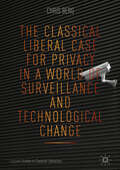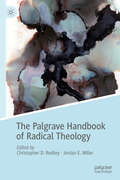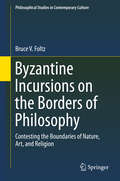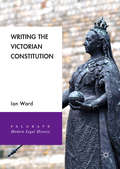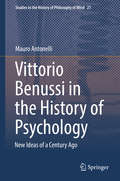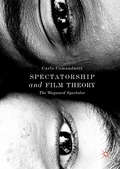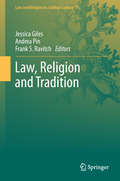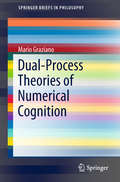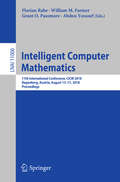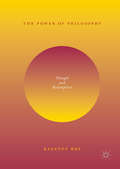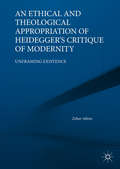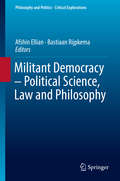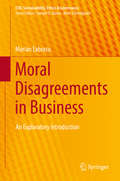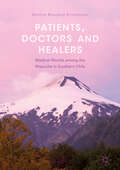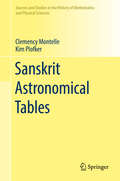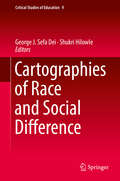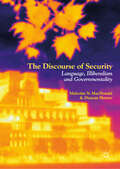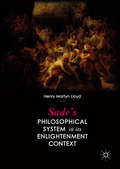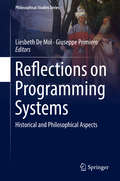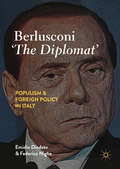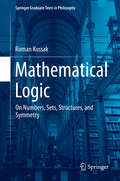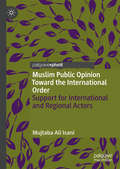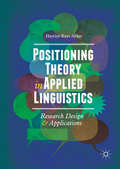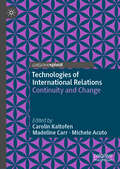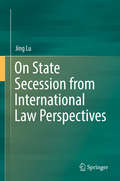- Table View
- List View
The Classical Liberal Case for Privacy in a World of Surveillance and Technological Change (Palgrave Studies in Classical Liberalism)
by Chris BergHow should a free society protect privacy? Dramatic changes in national security law and surveillance, as well as technological changes from social media to smart cities mean that our ideas about privacy and its protection are being challenged like never before. In this interdisciplinary book, Chris Berg explores what classical liberal approaches to privacy can bring to current debates about surveillance, encryption and new financial technologies. Ultimately, he argues that the principles of classical liberalism – the rule of law, individual rights, property and entrepreneurial evolution – can help extend as well as critique contemporary philosophical theories of privacy.
The Palgrave Handbook of Radical Theology (Radical Theologies and Philosophies)
by Christopher D. Rodkey Jordan E. MillerThe Palgrave Handbook of Radical Theology is the definitive guide to radical theology and the commencement for new directions in that field. For the first time, radical theology is addressed and assessed in a single, comprehensive volume, including introductory and historical essays for the beginner, essays on major figures and their thought, and shorter articles on various themes, concepts, and related topics. This book is a seminal work for the radical theology movement. It clarifies origins and demonstrates the exigency and utility of current figures and issues. A useful and essential guide for newcomers and veterans in the field, this volume serves as both a reference work and an introduction to omitted or forgotten topics within contemporary discussions.
Byzantine Incursions on the Borders of Philosophy: Contesting the Boundaries of Nature, Art, and Religion (Philosophical Studies in Contemporary Culture #26)
by Bruce V. FoltzThis book represents a series of incursions or philosophical forays between realms of Byzantine and Russian thought and territory long claimed by Western philosophy and theology. Beginning with thoughts inevitably rooted in the West, it seeks to penetrate as deeply as possible into Byzantine and Russian philosophical and spiritual landscapes, and to return with fresh insights. These are also incursions that move back and forth between the visible and the invisible realms, in the traditions of Plato and his successors as well as the great monastics of Eastern Christianity. Foltz argues from various perspectives that the problematic relation between transcendence and immanence finds its answer in the philosophical and theological legacy of Eastern Christian thought, which has always sought to bring together strands tenaciously held separate in the West. This book transports contemporary readers to an ancient conceptual landscape as it expertly handles both Western and Byzantine ideas with a familiarity unusual to contemporary scholars. It is essential reading for all those wishing to engage the heart of Byzantine thought and employ its lessons to address the problems which plague Western philosophy and culture.
Writing the Victorian Constitution (Palgrave Modern Legal History Ser.)
by Ian WardThis book charts the writing of the English constitution through the work of four of the most influential jurists in the history of English constitutional thought—Edmund Burke, Thomas Babington Macaulay, Walter Bagehot and Albert Venn Dicey. Stretching from the French Revolution to the death of Queen Victoria, their writing is both representative of and formative to the Victorian constitution. Ian Ward traces how constitutional writing changed over the course of the long nineteenth century, from the poetics of Burke and the romance of Macaulay, to the pragmatism of Bagehot and the jurisprudence of Dicey. A century on, our perception of the English constitution is still shaped by this contested history.
Vittorio Benussi in the History of Psychology: New Ideas of a Century Ago (Studies in the History of Philosophy of Mind #21)
by Mauro AntonelliThis book covers the basic guidelines of Vittorio Benussi’s research during the period at Graz and at Padua. It does so in the light of a thorough study of his Nachlass. The book re-evaluates Benussi’s work as a historical piece, and shows how his work is still relevant today, especially in the areas of cognitive psychology and cognitive science. The volume deals with this original and ingenious - though largely ignored - scholar and discusses his work as a leading experimental psychologist. Benussi’s contributions as discussed in this book were particularly relevant in the fields of visual and tactile perception, time perception, forensic psychology, hypnosis and suggestion, unconscious, and emotions. His classical papers are impressive in their originality, energy, range of approaches, experimental skill, the wealth of findings, and the quality of theoretical discussions. This book demonstrates that Benussi was ahead of his time and that his themes, experiments and research programmes are highly relevant to contemporary cognitive psychology.
Spectatorship and Film Theory: The Wayward Spectator
by Carlo ComanducciThis book interrogates the relation between film spectatorship and film theory in order to criticise some of the disciplinary and authoritarian assumptions of 1970s apparatus theory, without dismissing its core political concerns. Theory, in this perspective, should not be seen as a practice distinct from spectatorship but rather as an integral aspect of the spectator’s gaze. Combining Jacques Rancière’s emancipated spectator with Judith Butler’s queer theory of subjectivity, Spectatorship and Film Theory foregrounds the contingent, embodied and dialogic aspects of our experience of film. Erratic and always a step beyond the grasp of disciplinary discourse, this singular work rejects the notion of the spectator as a fixed position, and instead presents it as a field of tensions—a “wayward” history of encounters.
Law, Religion and Tradition (Law and Religion in a Global Context #1)
by Frank S. Ravitch Jessica Giles Andrea PinThis book explores different theories of law, religion, and tradition, from both a secular and a religious perspective. It reflects on how tradition and change can affect religious and secular legal reasoning, identifying the patterns of legal evolution within religious and secular traditions.It is often taken for granted that, even in law, change corresponds and correlates to progress – that things ought to be changed and they will necessarily get better. There is no doubt that legal changes over the centuries have made it possible to enhance the protection of individual rights and to somewhat contain the possibility of tyranny and despotism. But progress is not everything in law: stability and certainty lie at the core of the rule of law. Similarly, religions and religious laws could not survive without traditions; and yet, they still evolve, and their evolution is often intermingled with secular law.The book asks (and in some ways answers) the questions: What is the role of tradition within religions and religious laws? What is the impact of religious traditions on secular laws, and vice-versa? How are the elements of tradition to be identified? Are they the same within the secular and the religious realm? Do secular law and religious law follow comparable patterns of change? Do their levels of resilience differ significantly? How does the history of religion and law affect changes within religious traditions and legal systems?The overall focus of the book addresses the extent to which tradition plays a role in shaping and re-shaping secular and religious laws, as well as their mutual boundaries.
Dual-Process Theories of Numerical Cognition (SpringerBriefs in Philosophy)
by Mario GrazianoThis book presents a philosophical interpretation to numerical cognition based on dual process theories and heuristics. It shows how investigations in cognitive science can shed light on issues traditionally raised by philosophers of mathematics. The analysis will also help readers to better understand the relationship between current neuroscientific research and the philosophical reflection on mathematics. The author seeks to explain the acquisition of mathematical concepts. To accomplish this, he needs to answer two questions. How can the concepts of approximate numerosity become an object of thought that is so accessible to our consciousness? How are these concepts refined and specified in such a way as to become numbers? Unfortunately, there is currently no model that can truly demonstrate the role of language in the development of numerical skills starting from approximate pre-verbal skills. However, the author details a solution to this problem: dual process theories. It is an approach widely used by theorists focusing on reasoning, decision making, social cognition, and consciousness. Here, he applies this approach to the studies on mathematical knowledge. He details the results brought about by psychological and neuroscientific studies conducted on numerical cognition by key neuroscientists. In the process, he develops the foundations of a new, potential philosophical explanation on mathematical knowledge.
Intelligent Computer Mathematics: 11th International Conference, CICM 2018, Hagenberg, Austria, August 13-17, 2018, Proceedings (Lecture Notes in Computer Science #11006)
by Florian Rabe William M. Farmer Grant O. Passmore Abdou YoussefThis book constitutes the refereed proceedings of the 11th International Conference on Intelligent Computer Mathematics, CICM 2018, held in Hagenberg, Austria, in August 2018. The 23 full papers presented were carefully reviewed and selected from a total of 36 submissions. The papers focos on the Calculemus, Digital Mathematics Libraries, and Mathematical Knowledge Management tracks which also correspond to the subject areas of the predecessor meetings. Orthogonally, the Systems and Projects track called for descriptions of digital resources, such as data and systems, and of projects, whether old, current, or new, and survey papers covering any topics of relevance to the CICM community.
The Power of Philosophy: Thought And Redemption
by Kaustuv RoyThis book explores the possibility of philosophical praxis by weaving an ontological thread through four principal thinkers: Heidegger, Schelling, Goethe, and Heraclitus. It argues that a special kind of redemptive power awaits the structural understanding of thought that is beyond semantic formations such as concepts and ideational systems. The author claims that the “power” is negative in nature, trans-personal, and derived directly from the understanding of thought as a structural pulse. The book travels backwards in time, encountering successively Heidegger’s critique of calculative thinking, Schelling’s Mind/Nature relation, Goethe’s Delicate Empiricism, and the aphoristic wisdom of Heraclitus in search of a redemptive power that lies in the self-knowledge of thought. This power is ontological and not historical or developmental; it is the same at all times and all points of history. The author refers to the praxis as “philosophical bilingualism.”
An Ethical and Theological Appropriation of Heidegger’s Critique of Modernity: Unframing Existence
by Zohar AtkinsThis book is at once a deeply learned and original reading of Heidegger and a primary text in its own right. It demonstrates the relevance of Heidegger’s thought in responding to the moral and religious challenges of 21st century existence. It shows that Heidegger’s project can be defended against many criticisms once its existential character is taken seriously. What emerges is a powerful exercise in thinking, not about Heidegger, but with and against him. As such, Atkins engages Heidegger as a means of advancing a defense of spirituality in the modern world that holds spirituality itself accountable for its lapses into the mundane. Addressing the most influential figures in recent Continental philosophy, such as Emmanuel Levinas and Theodor W. Adorno, this is a work that will be of timely use to philosophers, theologians, artists, and seekers.
Militant Democracy – Political Science, Law and Philosophy (Philosophy and Politics - Critical Explorations #7)
by Afshin Ellian Bastiaan RijpkemaThis volume offers an up-to-date overview of the much-debated issue of how a democracy may defend itself against those who want to subvert it. The justifications, effectiveness and legal implications of militant democracy are discussed by addressing questions as: How can militant democracy measures such as party bans be justified? Why is it that some democracies ban antidemocratic parties? Does militant democracy succeed in combatting right-wing extremism? And is militant democracy evolving into an internationalized legal and political concept?Bringing together experts and perspectives from political science, law and philosophy, this volume advances our understanding of the current threats to democracy, a political system once thought almost invincible. It is especially timely in the light of the rise of illiberal democracy in the EU, the increasingly authoritarian rule in Turkey, the steady shift to autocracy in Russia and the remarkable election of Trump in the US.
Moral Disagreements in Business: An Exploratory Introduction (CSR, Sustainability, Ethics & Governance)
by Marian EabrasuThis book disassembles the moral assessment of business practices into its constituent parts to identify and clarify the four key concepts that form the basis of important moral disagreements in business: ‘personhood,’ ‘ownership,’ ‘harm,’ and ‘consent.’ ‘Moral bottom lines’ are those fundamental concepts in business ethics that ultimately account for our most resilient moral claims and unsurpassable convictions, and exploring them provides essential insights into the grounds on which we disagree in business ethics. This analysis is useful for students in business school looking to understand fundamental moral disagreements in business and for practitioners interested in connecting practice with their own moral intuitions. The book also challenges scholars of business ethics by arguing that we can reduce business ethics disagreements to these four issues."This is the most refreshing book on business ethics to appear in a long time. By focusing on 'personhood,' 'ownership,' 'harm,' and 'consent,' Eabrasu brings a new level of clarity and insight into disagreements on business ethic issues. Rather than reaching for an artificial utopian resolution, he embraces the challenge of explaining why we disagree. This is a must-read for serious business ethic scholars."Nicolas CapaldiLoyola University New OrleansLegendre-Soulé Distinguished Chair in Business Ethics
Patients, Doctors and Healers
by Dorthe Brogård KristensenRecognizing the interplay between biomedicine and indigenous medicine among the Mapuche in Southern Chile, this book explores notions of culture and personhood through the bodily experiences and medical choices of patients. Through case studies of patients in the context of medical pluralism, Kristensen argues that medical practices are powerful social symbol indicative of overarching socio-political processes. As certain types of extreme and violent experiences–known as olvidos–lack a framework that allows them to be expressed openly, they therefore surface as symptoms of an illness, often with no apparent organic pathology. In these contexts, indigenous medicine, thanks to its sensitivity to socio-political contexts, provides a space for articulation and management of collective experiences and suffering among patients in Southern Chile.
Sanskrit Astronomical Tables (Sources and Studies in the History of Mathematics and Physical Sciences)
by Kim Plofker Clemency MontelleThis groundbreaking volume provides an up-to-date, accessible guide to Sanskrit astronomical tables and their analysis. It begins with an overview of Indian mathematical astronomy and its literature, including table texts, in the context of history of pre-modern astronomy. It then discusses the primary mathematical astronomy content of table texts and the attempted taxonomy of this genre before diving into the broad outlines of their representation in the Sanskrit scientific manuscript corpus. Finally, the authors survey the major categories of individual tables compiled in these texts, complete with brief analyses of some of the methods for constructing and using them, and then chronicle the evolution of the table-text genre and the impacts of its changing role on the discipline of Sanskrit jyotiṣa. There are also three appendices: one inventories all the identified individual works in the genre currently known to the authors; one provides reference information about the details of all the notational, calendric, astronomical, and other classification systems invoked in the study; and one serves as a glossary of the relevant Sanskrit terms.
Cartographies of Race and Social Difference (Critical Studies of Education #9)
by George J. Sefa Dei Shukri HilowleThis book critically examines how race is constructed globally to intersect gender, class, sexuality, language ability and religion and answers some very important questions, like how does anti-black racism manifest itself within various contexts? Chapters in the book use the ‘Black and White paradigm’ as a lens for critical race analysis examining how, for example, the saliency of race and Blackness shape the ‘post-colony’, as well as the various ‘post’ colonial nations. The paradigm centers Whiteness as the lens of defining what and what is different. The negative portrayal of difference is anchored in the sanctity of Whiteness. It is through such analysis that we can understand how historically colour has been a permanent marker of differentiation even though it has not been the only one. It is through conversations and dialogue in the classroom that the book was created; given the current political shift in American and the rise of Anti-Blackness, anti-Indigeneity, Islamophobia and xenophobia. The book critically examines White supremacy, racialization of gender, “post-racial” false narratives, and other contemporary issues surrounding race.
The Discourse of Security: Language, Illiberalism And Governmentality (Postdisciplinary Studies in Discourse)
by Malcolm N. MacDonald Duncan HunterThis book explores how language constructs the meaning and praxis of security in the 21st century. Combining the latest critical theories in poststructuralist and political philosophy with discourse analysis techniques, it uses corpus tools to investigate four collections of documents harvested from national and international security organisations. This interdisciplinary approach provides insights into the ways in which discourse has been mobilised to construct a strategic response to major terrorist attacks and geo-political events. The authors identify the way in which it is used to realize tactics of governmentality and form security as a discipline. This at once constructs a state of exception while also adhering to the principles of liberalism. This insightful study will be of particular interest to students and scholars of subjects such as applied linguistics, political science, security studies and international relations, with additional relevance to other areas including law, criminology, sociology and economics.
Sade’s Philosophical System in its Enlightenment Context
by Henry Martyn LloydThis book connects the philosophy of the Marquis de Sade—one of the most notorious, iconic, and yet poorly-understood figures within the history of European thought—with the broader themes of the Enlightenment. Rather than seeing himself as a mere pornographer, Sade understood himself as continuing the progressive tradition of French Enlightenment philosophy. Sade aspired to be a philosophe. This book uses intellectual history and the history of philosophy to reconstruct Sade’s philosophical ‘system’ and its historical context. Within the period’s discourse of sensibility Sade draws on the philosophical and the literary to form a relatively sophisticated ‘system’ which he deploys to critically engage with the two major strands of eighteenth-century ethical theory: the moral sense and natural law traditions. This work is of interest to: ‘Continental’ Philosophy, Critical Theory, French Studies, the History of Eighteenth-Century Philosophy, Literary Studies, the History of Moral Philosophy, and Enlightenment Studies.
Reflections on Programming Systems: Historical And Philosophical Aspects (Philosophical Studies Series #133)
by Giuseppe Primiero Liesbeth De MolThis book presents a historical and philosophical analysis of programming systems, intended as large computational systems like, for instance, operating systems, programmed to control processes. The introduction to the volume emphasizes the contemporary need of providing a foundational analysis of such systems, rooted in a broader historical and philosophical discussion. <P><P> The different chapters are grouped around three major themes. The first concerns the early history of large systems developed against the background of issues related to the growing semantic gap between hardware and code. The second revisits the fundamental issue of complexity of large systems, dealt with by the use of formal methods and the development of `grand designs’ like Unix. Finally, a third part considers several issues related to programming systems in the real world, including chapters on aesthetical, ethical and political issues. <P><P> This book will interest researchers from a diversity of backgrounds. It will appeal to historians, philosophers, as well as logicians and computer scientists who want to engage with topics relevant to the history and philosophy of programming and more specifically the role of programming systems in the foundations of computing.
Berlusconi ‘The Diplomat’: Populism and Foreign Policy in Italy
by Emidio Diodato Federico NigliaThis book analyses the foreign policy of Silvio Berlusconi, Italian media tycoon and politician who served as Prime Minister of Italy in four governments. The authors examine the Italian position in the international arena and its foreign policy tradition, as well as Berlusconi’s general political stance, Berlusconi’s foreign policy strategies and the impact of those strategies in Italy. Given that Berlusconi is considered a populist leader, the volume considers his foreign policy as an instance of populist foreign policy – an understudied but increasingly relevant topic.
Mathematical Logic: Essays On Set Theory, Model Theory, Philosophical Logic And Philosophy Of Mathematics (Ontos Mathematical Logic Ser. #5)
by Roman KossakThis book, presented in two parts, offers a slow introduction to mathematical logic, and several basic concepts of model theory, such as first-order definability, types, symmetries, and elementary extensions. Its first part, Logic Sets, and Numbers, shows how mathematical logic is used to develop the number structures of classical mathematics. The exposition does not assume any prerequisites; it is rigorous, but as informal as possible. All necessary concepts are introduced exactly as they would be in a course in mathematical logic; but are accompanied by more extensive introductory remarks and examples to motivate formal developments. The second part, Relations, Structures, Geometry, introduces several basic concepts of model theory, such as first-order definability, types, symmetries, and elementary extensions, and shows how they are used to study and classify mathematical structures. Although more advanced, this second part is accessible to the reader who is either already familiar with basic mathematical logic, or has carefully read the first part of the book. Classical developments in model theory, including the Compactness Theorem and its uses, are discussed. Other topics include tameness, minimality, and order minimality of structures. The book can be used as an introduction to model theory, but unlike standard texts, it does not require familiarity with abstract algebra. This book will also be of interest to mathematicians who know the technical aspects of the subject, but are not familiar with its history and philosophical background.
Muslim Public Opinion Toward the International Order: Support For International And Regional Actors
by Mujtaba Ali IsaniThis book analyses the attitudes of Muslim citizens toward international and regional actors. In essence, the project examines whether Muslim public opinion is in favor of the current international order and if there is an ideal type of international governance perceived by Muslim citizens. The author connects the analysis to the literature of international public opinion and to the research on social legitimacy of international and global governance. It is ideal for scholarly audiences interested in Islamic, International and Global Governance Studies.
Positioning Theory in Applied Linguistics: Research Design and Applications
by Hayriye Kayı-AydarThis book is about Positioning Theory (Davies & Harré, 1990) and its potential applications in bilingual and multilingual contexts involving teachers, learners, speakers, and users of a second/foreign or additional language. By using Positioning Theory as a theoretical lens and analytical approach, the author illustrates how various social and poststructural concepts in applied linguistics and language teacher education, including identity, agency, language socialization, classroom participation, and intercultural communication, can be investigated and better understood. The book adds a new perspective to the growing body of multidisciplinary literature in the areas of L2 teacher education and classroom learning, and includes step-by-step guidelines for positioning analysis, insights and implications for classroom practice, as well as suggested directions for future research. It will be of particular interest to language teachers and teacher educators, as well as students and scholars of applied linguistics more broadly.
Technologies of International Relations: Continuity And Change
by Michele Acuto Carolin Kaltofen Madeline CarrThis book examines the role of technology in the core voices for International Relations theory and how this has shaped the contemporary thinking of ‘IR’ across some of the discipline’s major texts. Through an interview format between different generations of IR scholars, the conversations of the book analyse the relationship between technology and concepts like power, security and global order. They explore to what extent ideas about the role and implications of technology help to understand the way IR has been framed and world politics are conceived of today. This innovative text will appeal to scholars in Politics and International Relations as well as STS, Human Geography and Anthropology.
On State Secession from International Law Perspectives
by Jing LuThis book provides essential legal information on state secession in an innovative manner: unlike conventional approaches, which invariably focus on whether there is a right to secession, here the discussion centers on how secessionist conflicts can be effectively resolved. To that end, the book not only reveals the inadequacy of the current international legal framework, but also carefully considers how relevant actors can work to improve the legal system. In short, it argues that secessionists and non-secessionists should conclude an agreement to reconcile their conflicting rights to self-determination, while external actors should do their utmost to ensure the success of these efforts. Positive external involvement requires external actors to refrain from the use of force and to participate more rationally in secessionist conflicts. Given its subject matter, the book will appeal to a broad readership, including students and researchers in international law, international relations and ethnic studies, as well as enthusiasts in these fields.
